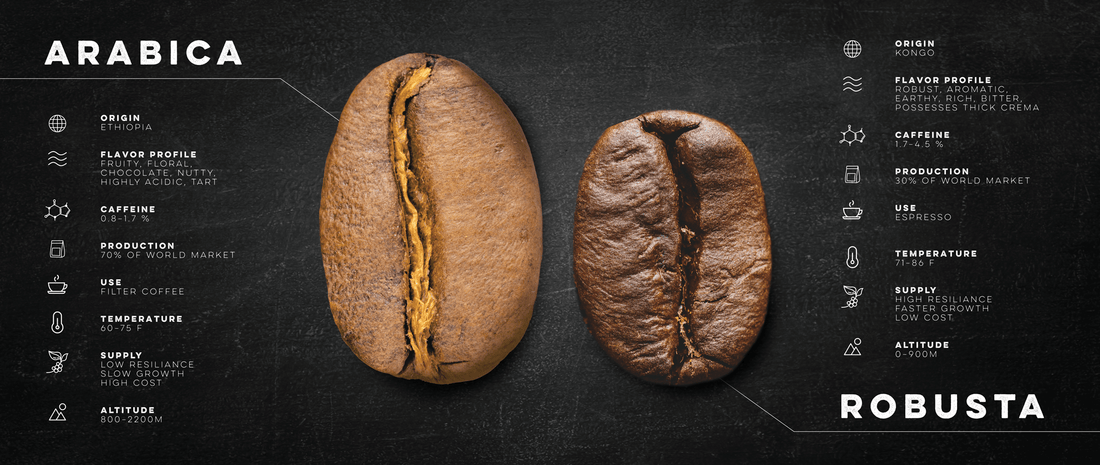The argument of Arabica vs Robusta coffee is a long-standing one among coffee enthusiasts and connoisseurs. Each stands out in the world of coffee thanks to its devoted fan base, distinctive flavor profile, and unique qualities.
However, what distinguishes these two varieties of coffee, and why is there a market for both in the world of coffee? To comprehend the main distinctions between Arabica and Robusta coffee and the reasons behind each variety's unique positioning, let's take a closer look at the complex world of coffee.
The Arabica Advantage: Elegance in Every Sip
The queen of specialty coffees is Arabica coffee, which is prized for its complex fragrances and delicate flavor characteristics. Arabica beans’ flavor characteristics range from fruity and floral to chocolatey and nutty. They originate from the highlands of Ethiopia. The popularity of this variety of coffee cannot be denied because it makes up most of the world's production.
The fact that Arabica coffee has less caffeine than Robusta coffee is one of its unique selling points. Although the amount of caffeine in Arabica varies according to factors like roast level and growth conditions, it is approximately half that of Robusta. Arabica is therefore the recommended option for anyone who is sensitive to caffeine or wants a softer cup of coffee.
In addition, Arabica beans are praised for having a high acidity level, which enhances their vivid flavors. Each cup gains depth and complexity from this acidity, which can be delicate and wine-like or lemony and tart. Arabica coffee accentuates its natural sweetness and acidity when paired with a medium to light roast, creating a smooth and sophisticated beverage.
Robusta Resilience: Boldness in Every Brew
When it comes to Arabica vs. Robusta, Robusta is distinguished by its stronger flavor profile and greater caffeine level. Robusta beans are native to Africa and Southeast Asia, and they are distinguished by their robust, earthy aromas and thick mouthfeel. Robusta has a devoted following among coffee lovers worldwide, despite the fact that some may find it harsher or more bitter than Arabica.
Robusta coffee is known for having a greater caffeine concentration than Arabica coffee—up to almost twice as much. Because of this, Robusta is a great option for people who want a quick caffeine boost or for adding rich, crema-filled shots to espresso blends.
In addition to their resilience to diseases and pests, robusta beans are highly valued for their capacity to flourish in low-altitude situations. Because of its hardiness, Robusta coffee is a more sustainable choice for growers in areas where Arabica growing may be difficult. Furthermore, Robusta plants’ increased yields and quicker growth seasons add to their accessibility and affordability in the world market for coffee.
Finding Harmony: Embracing Diversity in Coffee Culture
Although the argument of Arabica vs. Robusta coffee frequently provokes intense debates among coffee connoisseurs, the truth is that each variety has distinct characteristics of its own that add to the world of coffee's richness and diversity. Accepting the differences between Arabica and Robusta instead of putting them against one another enables us to enjoy the wide range of tastes and experiences that coffee may provide.
Blending Arabica and Robusta beans together to create signature blends that combine the greatest qualities of both worlds has become a standard technique in the specialty coffee market. Roasters may create rich, flavorful blends that appeal to a broad palate by fusing the robustness of Robusta with the subtle nuances of Arabica.
The distinct characteristics of Arabica and Robusta coffee provide opportunities for exploration and experimentation in brewing methods and flavor profiles. Whether you prefer the bright acidity of a single-origin Ethiopian Arabica or the bold intensity of a Vietnamese Robusta, there is a coffee experience to suit every taste preference and occasion.
Ultimately, the argument between Robusta and Arabica coffee boils down to individual taste and a respect for the wide diversity of flavors and sensations that each type has to offer. Let’s celebrate the richness and diversity of the coffee world while we sip on a cup that appeals to our particular tastes and preferences; all the while appreciating the distinctive characteristics of and making space for both Arabica and Robusta coffee beans.

